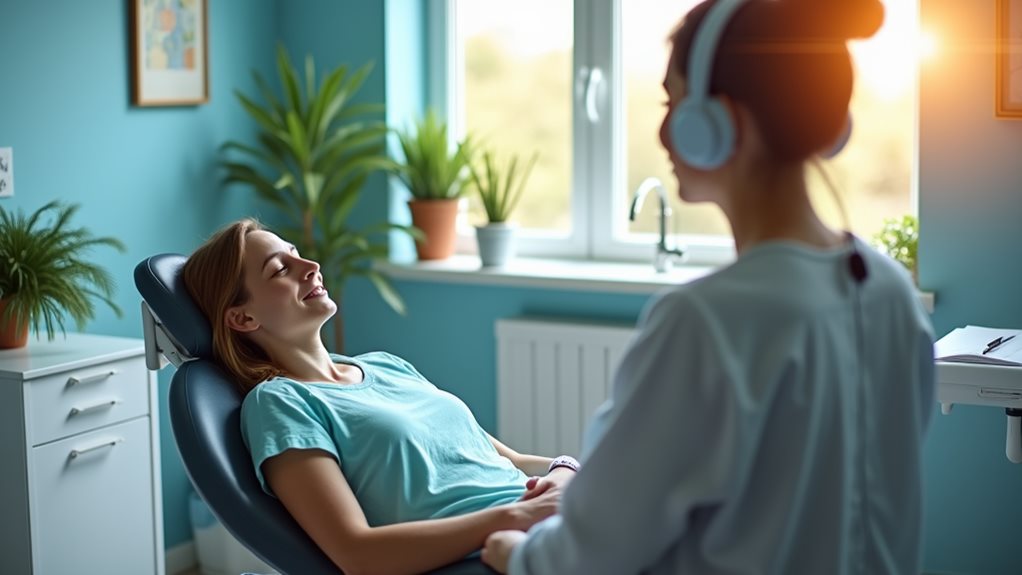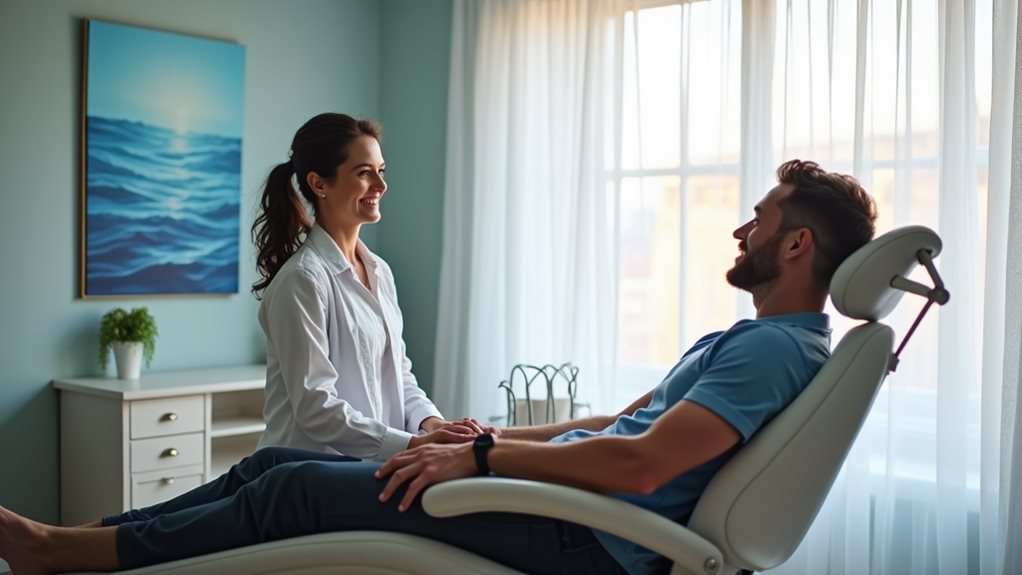
To conquer dental fear, integrating Hypnosis and Neuro-Linguistic Programming (NLP) proves highly effective. These techniques address deep-seated anxieties by modifying subconscious narratives associated with dental procedures, leading to a more relaxed and controlled experience. Hypnosis promotes relaxation, while NLP reshapes detrimental perceptions, offering a dual approach that greatly alleviates dental anxiety. Empowering patients with these tools can transform their dental visits from a source of distress to one of calm reassurance, paving the way for healthier oral care practices.
Key Takeaways
- Hypnosis induces deep relaxation, easing the mind into a calm state during dental procedures.
- NLP techniques, like anchoring, associate positive feelings with dental visits, reducing anxiety.
- Using guided imagery from hypnosis helps patients visualize a stress-free dental experience.
- Reframing through NLP transforms fearful thoughts about dentistry into more positive perspectives.
- Combining both methods enhances emotional resilience and control over dental fear.
Understanding Dental Fear and Its Impact
While many people may not openly discuss it, dental fear greatly impacts a substantial portion of the population, often stemming from prior traumatic experiences or deep-seated fears of pain and loss of control.
These anxieties not only deter regular dental visits but can lead to significant deterioration of oral and overall health.
Analyzing the causes of dental fear is vital in addressing these issues effectively. Emphasizing gradual desensitization, cognitive-behavioral therapy, and relaxation techniques, dental professionals can create a more comforting environment, encouraging patients to maintain their dental health without the paralyzing effects of fear.
This approach emphasizes empathy and proactive solutions.
The Role of Hypnosis in Managing Dental Anxiety
Building on the foundation of understanding and addressing dental fear, hypnosis emerges as a powerful tool in managing dental anxiety. Hypnosis techniques, specifically tailored for dental settings, involve deep relaxation methods that guide patients to a tranquil mental state. This approach not only alleviates immediate anxiety but also reconditions the mind to associate dental visits with calmness and safety.
| Emotion Before | Hypnosis Technique | Emotion After |
|---|---|---|
| Fear | Guided Imagery | Calm |
| Panic | Deep Breathing | Control |
| Dread | Positive Affirmations | Assurance |
NLP Techniques to Transform Your Dental Experience

Neuro-Linguistic Programming (NLP) offers transformative techniques that reshape the way individuals perceive and react to dental visits.
Using NLP Anchoring Techniques, patients can create positive associations with specific sensory experiences, such as a calming scent or sound, effectively countering anxiety during appointments.
Additionally, NLP helps in Reframing Negative Thoughts by identifying and altering detrimental beliefs about dental care.
How Hypnosis Works to Calm Your Mind
Understanding how hypnosis works to calm the mind is essential for those suffering from dental fear.
Hypnosis initiates a deeply relaxed state where the individual can engage in mindful breathing and visualization exercises, key techniques in managing anxiety. Through guided visualization, patients imagine themselves handling a dental visit calmly, which can greatly alter their emotional response to real-life dental situations.
Mindful breathing during hypnosis helps maintain this calm by focusing the mind and slowing the heartbeat, facilitating a serene mental environment. This process not only reduces immediate anxiety but also gradually reprograms the fear response associated with dental care.
Practical NLP Strategies for Overcoming Phobia

While overcoming dental phobia may seem intimidating, practical NLP (Neuro-Linguistic Programming) strategies offer valuable tools for those struggling with intense fears.
By identifying specific phobia triggers, individuals can begin to dismantle the overwhelming sensations associated with dental visits.
NLP techniques such as mental rehearsal empower patients to envision themselves handling a dental appointment successfully, reducing anxiety proactively.
This method involves repeatedly visualizing positive outcomes, gradually desensitizing the individual to the source of their fear.
Such strategies not only mitigate phobias but also foster a sense of control and resilience, making dental care a more approachable experience.
Combining Hypnosis and NLP for Maximum Effect
By combining the deep relaxation techniques of hypnosis with the cognitive reprogramming capabilities of NLP, individuals facing dental phobia can experience a more profound and lasting relief from their fears.
This approach creates a therapeutic synergy, enhancing each method's effectiveness in fostering emotional release and resilience against anxiety.
- Therapeutic Synergy: Hypnosis and NLP work together to intensify each other's impact, offering a dual approach to managing dental anxiety.
- Emotional Release: Assists in releasing deep-seated fears, enabling a more relaxed state during dental visits.
- Resilience Building: Develops stronger coping mechanisms, making future dental appointments less intimidating.
Success Stories: Real-Life Overcoming of Dental Fear

The combination of hypnosis and NLP not only offers a theoretical promise but has also been mirrored in the experiences of numerous individuals who have successfully overcome their dental fears.
Real-life transformations are vividly portrayed in patient testimonials, revealing profound shifts from debilitating anxiety to calm assertiveness. These stories provide empirical support, highlighting how tailored approaches effectively dismantle deep-seated fears.
Analyzing these successes, it becomes clear that a blend of empathetic understanding, strategic intervention, and patient-centric techniques fosters an environment where individuals can reframe their dental experiences positively, replacing fear with manageable calmness and control.
Getting Started: Steps to Take Today
Are you ready to take the first step towards conquering your dental fear?
Beginning the journey requires thoughtful initial assessment and strategic treatment planning. Here are three actionable steps you can take today:
- Contact a Qualified Therapist: Find a professional skilled in hypnosis, NLP, and dental anxiety management.
- Schedule an Initial Assessment: Discuss your fears and experiences to tailor a thorough treatment plan.
- Educate Yourself: Learn about the techniques used in treatment, such as hypnosis and NLP, to demystify the process and ease anxiety.
Embarking on this path is a commitment to transforming your dental health experience.
Frequently Asked Questions
What Is the Average Cost of Hypnosis and NLP Sessions for Dental Fear?
The average cost of sessions addressing dental fear through hypnosis and NLP varies widely, influenced by session pricing, therapist qualifications, and treatment duration. Costs reflect the tailored approach necessary for effective fear mitigation.
Can Dental Fear Hypnosis Sessions Be Covered by Health Insurance?
Ironically, while dental insurance often covers traditional treatments, coverage for dental fear hypnosis sessions varies. Exploring specific policy details reveals potential options, offering a pathway to manage anxiety through alternative therapeutic approaches.
Are There Age Restrictions for Undergoing Hypnosis or NLP for Dental Anxiety?
Age restrictions for hypnosis or NLP vary based on treatment guidelines and practitioner discretion. Typically, these therapies are adapted to suit different age groups, ensuring appropriate and effective anxiety management for all individuals.
How Do I Find Certified Hypnotherapists or NLP Practitioners Specializing in Dental Phobia?
To find certified professionals in this area, one should consult practitioner directories and verify certification requirements to guarantee expertise in handling dental phobia. This approach helps in selecting qualified hypnotherapists or NLP practitioners.
What Are Common Misconceptions About Using Hypnosis and NLP for Dental Fear?
Common misconceptions include misunderstanding hypnosis as mind control and doubting NLP's effectiveness. In reality, both are respected techniques that facilitate relaxation and positive behavioral changes, helping individuals manage their dental fears effectively.
Conclusion
In the domain of oral health, the confluence of hypnosis and NLP emerges as a beacon of hope for those ensnared by dental fear. By reprogramming the mind's response to dental stimuli, these techniques not only foster an environment of tranquility but also empower individuals to reclaim control over their dental experiences. Such innovative approaches not only promise a revolution in dental care but also symbolize a broader, renaissance-like revival in holistic health management, enhancing both smiles and spirits.





